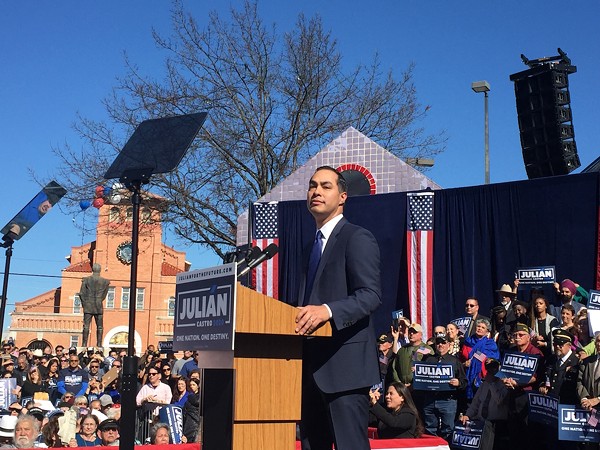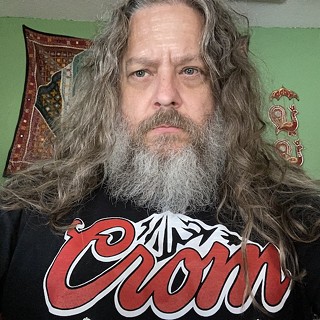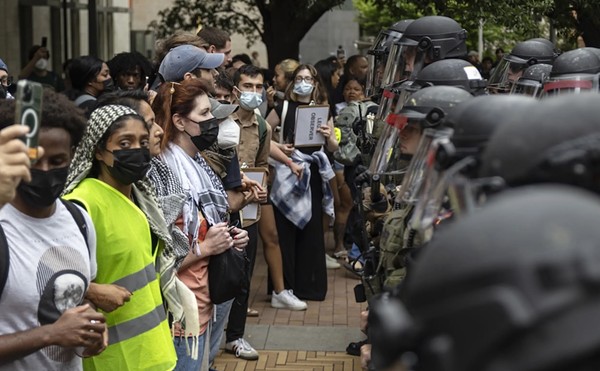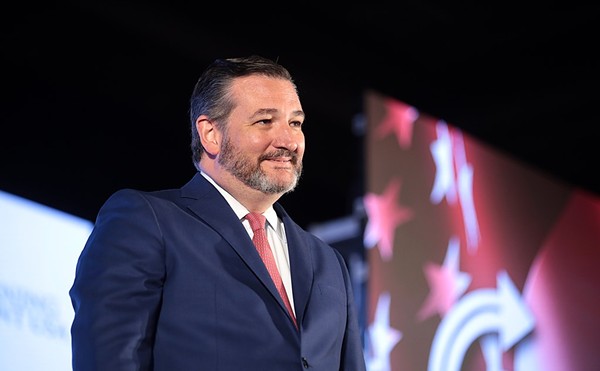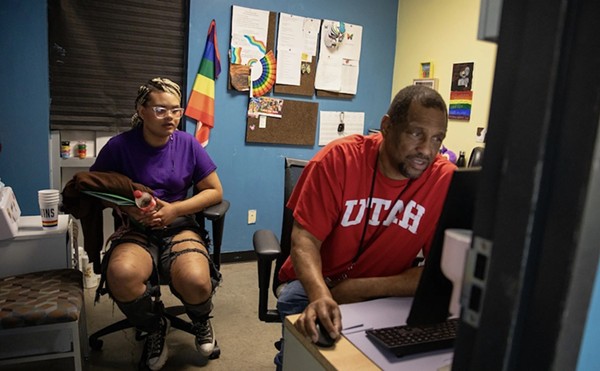Julián Castro’s Presidential Ambitions Will Show Just How Shrewd an Operator He Can Become
By Sanford Nowlin on Wed, Jan 16, 2019 at 8:00 am
Editor's Note: The following is City Current, a column of opinion and analysis.
When announcing his presidential bid on Saturday, Julián Castro showed all the political savvy that elevated him to political rising star during his 2012 keynote address at the Democratic convention.
In many ways — from the unapologetically left-of-center policy planks he unveiled in his speech to the way he’s making his family’s immigrant background a major storyline — the whole affair seemed to position him as the Anti-Trump.
Where Trump, 72, represents a twilit era, the 44-year-old Castro is a fresh face. Where Trump has stoked fear of immigrants, Castro delivered part of his speech in Spanish. Where Trump clings to divisive politics, Castro delivered an aspirational, big-tent message.
But Anti-Trump status alone won’t be enough for the former San Antonio mayor and Obama White House HUD secretary to make history as the first Hispanic person to win the presidential nomination of a major U.S. party.
To become a viable candidate, Castro will need to play on a larger scale than ever before, spending the coming months punching his national poll numbers through the roof, raising a fattened-to-bursting war chest and gathering powerful party allies.
That may be easier said than done in a Democratic field that some experts think could balloon to more than a couple dozen.
Not to mention, Castro’s starting from way behind. Right now, he polls between 0 and 2 percent, trailing the double-digit showings of Joe Biden and fellow Texan Beto O’Rourke, neither of whom has formally announced.
Given the numbers, Castro was smart to jump into the fray early, said David Crockett, a scholar of presidential politics at Trinity University. As one of the first contenders to declare, early excitement could help bolster name recognition.
“Castro’s youthful, he’s Hispanic and he has a record,” Crockett said. “And right now, there’s a very soft, fuzzy top tier.”
Leveraging the early start, Castro has already dropped in on primary states and published a memoir laying out his background and vision for the country. And despite pledging to not accept PAC money for his presidential campaign, he started the Opportunity First PAC to help elect Democratic contenders and bolster his party profile.
Castro’s also gotten an early jump on fundraising.
He’s been soliciting contributions since last year via his exploratory committee’s website, and as early as November, started organizing fundraising events for party financiers. Helping him curate those gatherings, according to Politico and CNBC, was Scott Atlas, the high-profile Houston attorney who served as one of O’Rourke’s major backers during his close bid to unseat Senator Ted Cruz.
Whether roping in Atlas is an attempt to replicate O’Rourke’s success or keep a key fundraiser out of his potential rival’s tool chest, it’s clear Castro understands the need to construct a nationwide donor base.
However, his challenges go beyond funding. Castro will need to convince Democrats he’s their best hope for taking down Trump.
Hispanic voters remain a coveted bloc for the Democratic Party, but Castro has got to show the party establishment that he can deliver more than the Mexican-American votes that carried him into two terms as San Antonio’s mayor.
To that end, Castro’s time with the Obama White House could offer a potential inroad with party loyalists. His relative youth and aspirational message could also endear him to millennials — another bloc that will be key to his electability, according to a recent FiveThirtyEight analysis.
Castro may win points as a fresh-faced outsider at a time when voters’ distrust of Washington is at an unprecedented high, but he could have a hard time selling mainline Democrats that he’s got the needed experience. He’s yet to hold statewide office, for example, and foreign policy was notably absent from his announcement speech, highlighting another potential weakness.
So, even if Castro can turn his age and outsider status into strengths, he’ll need to work the inside track like a seasoned pro. It will be a test of just how smooth a pollitical operator he’s capable of becoming.
Not that Castro would admit it — no presidential candidate ever does — but he could recognize the long-shot nature of his candidacy makes him a more attractive contender for vice president than the top of the ticket.
He also might have the long game in mind, understanding his prospects will grow as he builds a name and demographics continue to swing in his favor. This run, in other words, could prove good practice for the next. Or the one after that.
“He’s relatively young,” Crockett said. “He’s still got several election cycles he could run for.”
Stay on top of San Antonio news and views. Sign up for our Weekly Headlines Newsletter.
When announcing his presidential bid on Saturday, Julián Castro showed all the political savvy that elevated him to political rising star during his 2012 keynote address at the Democratic convention.
In many ways — from the unapologetically left-of-center policy planks he unveiled in his speech to the way he’s making his family’s immigrant background a major storyline — the whole affair seemed to position him as the Anti-Trump.
Where Trump, 72, represents a twilit era, the 44-year-old Castro is a fresh face. Where Trump has stoked fear of immigrants, Castro delivered part of his speech in Spanish. Where Trump clings to divisive politics, Castro delivered an aspirational, big-tent message.
But Anti-Trump status alone won’t be enough for the former San Antonio mayor and Obama White House HUD secretary to make history as the first Hispanic person to win the presidential nomination of a major U.S. party.
To become a viable candidate, Castro will need to play on a larger scale than ever before, spending the coming months punching his national poll numbers through the roof, raising a fattened-to-bursting war chest and gathering powerful party allies.
That may be easier said than done in a Democratic field that some experts think could balloon to more than a couple dozen.
Not to mention, Castro’s starting from way behind. Right now, he polls between 0 and 2 percent, trailing the double-digit showings of Joe Biden and fellow Texan Beto O’Rourke, neither of whom has formally announced.
Given the numbers, Castro was smart to jump into the fray early, said David Crockett, a scholar of presidential politics at Trinity University. As one of the first contenders to declare, early excitement could help bolster name recognition.
“Castro’s youthful, he’s Hispanic and he has a record,” Crockett said. “And right now, there’s a very soft, fuzzy top tier.”
Leveraging the early start, Castro has already dropped in on primary states and published a memoir laying out his background and vision for the country. And despite pledging to not accept PAC money for his presidential campaign, he started the Opportunity First PAC to help elect Democratic contenders and bolster his party profile.
Castro’s also gotten an early jump on fundraising.
He’s been soliciting contributions since last year via his exploratory committee’s website, and as early as November, started organizing fundraising events for party financiers. Helping him curate those gatherings, according to Politico and CNBC, was Scott Atlas, the high-profile Houston attorney who served as one of O’Rourke’s major backers during his close bid to unseat Senator Ted Cruz.
Whether roping in Atlas is an attempt to replicate O’Rourke’s success or keep a key fundraiser out of his potential rival’s tool chest, it’s clear Castro understands the need to construct a nationwide donor base.
However, his challenges go beyond funding. Castro will need to convince Democrats he’s their best hope for taking down Trump.
Hispanic voters remain a coveted bloc for the Democratic Party, but Castro has got to show the party establishment that he can deliver more than the Mexican-American votes that carried him into two terms as San Antonio’s mayor.
To that end, Castro’s time with the Obama White House could offer a potential inroad with party loyalists. His relative youth and aspirational message could also endear him to millennials — another bloc that will be key to his electability, according to a recent FiveThirtyEight analysis.
Castro may win points as a fresh-faced outsider at a time when voters’ distrust of Washington is at an unprecedented high, but he could have a hard time selling mainline Democrats that he’s got the needed experience. He’s yet to hold statewide office, for example, and foreign policy was notably absent from his announcement speech, highlighting another potential weakness.
So, even if Castro can turn his age and outsider status into strengths, he’ll need to work the inside track like a seasoned pro. It will be a test of just how smooth a pollitical operator he’s capable of becoming.
Not that Castro would admit it — no presidential candidate ever does — but he could recognize the long-shot nature of his candidacy makes him a more attractive contender for vice president than the top of the ticket.
He also might have the long game in mind, understanding his prospects will grow as he builds a name and demographics continue to swing in his favor. This run, in other words, could prove good practice for the next. Or the one after that.
“He’s relatively young,” Crockett said. “He’s still got several election cycles he could run for.”
Stay on top of San Antonio news and views. Sign up for our Weekly Headlines Newsletter.

KEEP SA CURRENT!
Since 1986, the SA Current has served as the free, independent voice of San Antonio, and we want to keep it that way.
Becoming an SA Current Supporter for as little as $5 a month allows us to continue offering readers access to our coverage of local news, food, nightlife, events, and culture with no paywalls.
Scroll to read more San Antonio News articles
About The Author
Newsletters
Join SA Current Newsletters
Subscribe now to get the latest news delivered right to your inbox.

